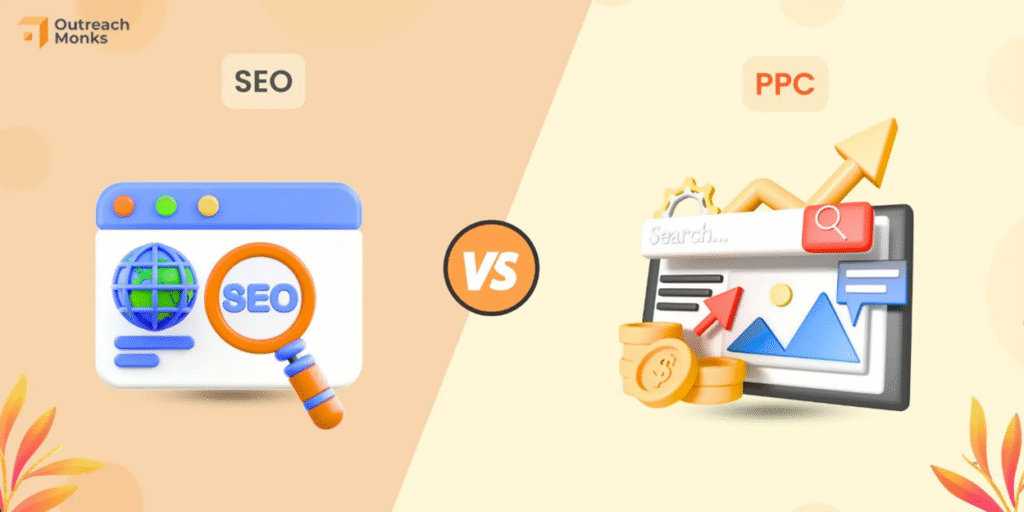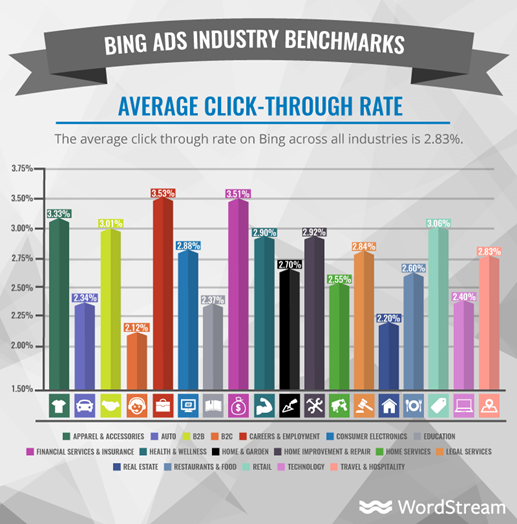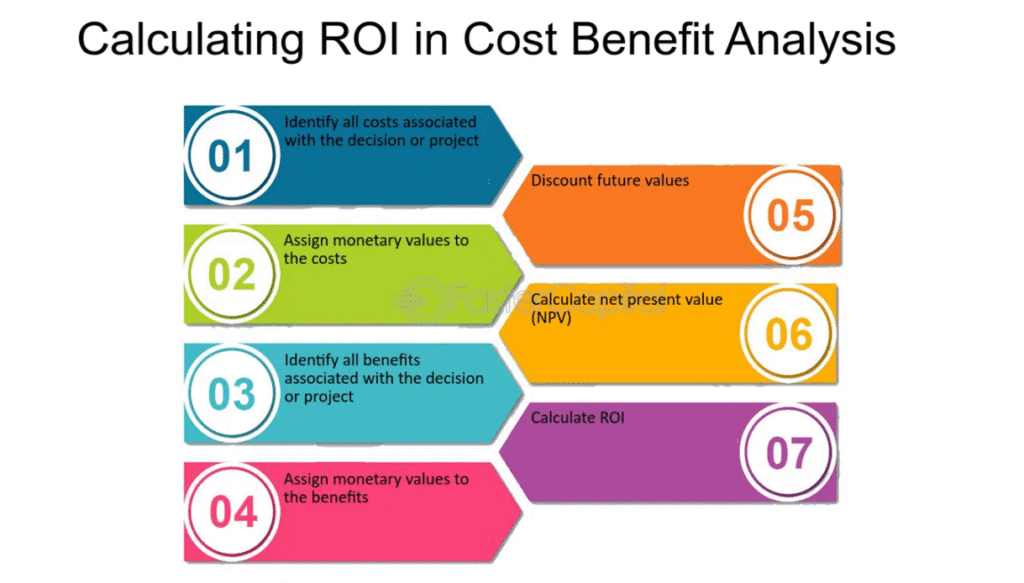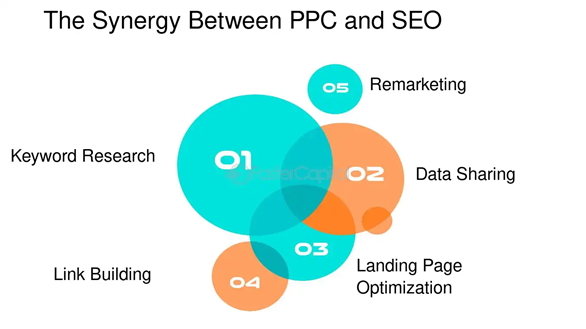
In today’s competitive digital scene, businesses maximize their return on investment (ROI) through key online promotions. Two of the most noticeable tactics, Search Engine Optimisation (SEO) and Pay-Per-Click Promoting (PPC), offer ways to visibility, activity, and change. Choosing between SEO and PPC regularly pivots on variables such as budget, objectives, timeline, and the competitive environment. However, rather than viewing them as opposing strategies, many modern businesses are discovering the power of SEO and PPC synergy.
By integrating both approaches, companies can balance long-term growth with short-term gains, ultimately enhancing overall digital marketing effectiveness. This article analyses SEO and PPC, assessing their viability and ROI to decide which methodology may be more useful for businesses.

Figure 1: SEO vs PPC
Source: https://outreachmonks.com/seo-vs-ppc/
Understanding SEO and PPC Synergy in Digital Marketing
Search engine optimization, or SEO, is a digital strategy focused on increasing a website’s visibility in unpaid search engine results. SEO consists of content optimization, technical aspects of the site, user experience improvement, and backlink generation for the site’s authority to improve ranking in Google. This process usually involves on-page optimization (keywords, meta tags), off-page strategies (link earning), and technical aspects of SEO (site speed, mobile friendliness, and crawlability).
In contrast, Pay-Per-Click (PPC) advertising, such as Google Ads or Bing Ads, falls under the paid search category. This model allows marketers to pay a fee whenever their ad is clicked. Established frameworks provide visibility by paying for ad placement at the top of search results based on bid amounts, quality scores, and relevance to the user’s search criteria. It provides instantaneous targeted traffic because businesses can show ads to users searching for specific products or services.

Figure 2Bing Ads
Source: https://www.wordstream.com/blog/ws/2017/11/06/bing-ads-performance-benchmarks
Cost and ROI Comparison: Evaluating SEO and PPC Synergy
SEO: High Long-Term ROI
One of SEO’s key advantages is its cost-efficiency over the long term. Once a website establishes strong organic rankings, ongoing traffic is free, aside from maintenance and content creation costs. A study by BrightEdge (2021) revealed that over 53% of website traffic comes from organic search, highlighting the effectiveness of SEO in driving consistent, high-intent visitors.

Figure :3 COST and ROI
Source: https://fastercapital.com/content/The-Role-of-ROI-in-Cost-Benefit-Analysis.html
However, SEO requires significant time and effort. Depending on the industry and keyword competition, it can take 3 to 6 months, or even longer, to see meaningful results. SEO is often more sustainable for businesses with long-term growth goals and limited advertising budgets.
PPC: Quick Results, But Higher Costs
PPC, by contrast, offers immediate exposure and traffic. Campaigns can be launched within hours, and results can be measured quickly. However, the cost per click (CPC) can be high, especially in competitive industries such as law, insurance, and e-commerce. Word Stream (2023) states that the average CPC across all industries is $2.69, but it can soar above $50 in some verticals.
PPC can also become less cost-effective over time if not properly optimized. Ad fatigue, poor targeting, and low-quality landing pages can drain ad spending with minimal returns. Therefore, ongoing A/B testing, keyword refinement, and budget monitoring are critical for maximizing PPC ROI.
Traffic Quality and Conversion Rates: Insights into SEO and PPC Synergy
SEO: Higher Trust, Lower Conversions?
Natural-looking results tend to gain more belief from clients. Numerous buyers skip advertisements and focus on natural postings, seeing them as more valid. This validity can lead to higher brand dependability and engagement. SEO also bolsters a broader range of content formats—such as blog posts, FAQS, and guides—which teach and sustain leads over time. However, SEO traffic may convert at a lower rate than PPC traffic because users are earlier in the buying journey.
PPC: High Intent and Better Targeting
PPC exceeds expectations by focusing on clients with high commercial expectations. Sponsors can be offered on catchphrases with buying signals, such as “buy now,” “compare,” or “discount.” Also, PPC stages offer progress based on socioeconomics, area, gadgets, behavior, and time of day. As a result, PPC regularly accomplishes higher transformation rates, particularly for e-commerce, time-sensitive offers, or lead-generation campaigns.
Besides, the capacity to retarget guests with show advertisements or remarketing campaigns includes an additional layer of transformation optimization, regularly driving higher ROI for businesses with complex or longer deal cycles.
Scalability and Flexibility Through SEO and PPC Synergy
SEO: Scales with Time
SEO offers compounding benefits. Once a page positions well, it can pull in thousands of guests over time without extra cost per press. SEO strides in general site well-being, making scaling other digital marketing efforts less demanding. Be that as it may, SEO is less adaptable in responding to advertising changes. Unused substances or optimizations take time to file and rank, and calculation changes can affect activity unusually.
PPC: Instant Control and Experimentation
PPC is profoundly agile. Marketers can alter campaigns, test creatives, alter landing pages, and delay underperforming advertisements anytime. This adaptability permits speedy experimentation and optimization, making PPC capable of advancements, product launches, or regular campaigns. Businesses can immediately scale PPC campaigns by expanding their day-to-day advertising budget, which is impossible with SEO.
Long-Term Strategy and Brand Building with SEO and PPC Synergy
SEO: Stronger Long-Term Value
Investing in SEO builds a durable foundation for digital presence. Quality content and backlinks continue to provide value long after they’re created. Moreover, SEO supports brand authority by positioning businesses as industry thought leaders through blogs, guides, and resources. A high-ranking website also boosts credibility with consumers and search engines, creating a positive feedback loop of increased visibility and engagement.
PPC: Effective for Short-Term Goals
PPC effectively drives immediate traffic and conversions, especially during critical business phases. However, once the budget stops, the traffic disappears. Thus, PPC does not provide long-term value unless continually funded. While SEO efforts are underway, PPC may serve as an excellent launch strategy for startups and new products.
SEO and PPC Synergy
Rather than choosing one over the other, many businesses successfully combine SEO and PPC. For example, PPC can drive immediate results while SEO efforts gain traction. Data from PPC campaigns—such as high-performing keywords—can inform SEO strategy. Conversely, SEO insights can reduce PPC costs by improving Quality Scores and landing page relevance.

Figure 4 Synergy B/W SEO and PPC
Source: https://fastercapital.com/topics/leveraging-the-synergy-of-ppc-and-seo-for-success.html
An integrated approach ensures that businesses capture visibility across paid and organic channels, increasing the total share of search results and maximizing exposure to potential customers.
In my experience working with SEO and PPC-focused content, businesses that combine paid search data with long-term organic strategies consistently outperform those that rely on SEO or PPC alone.
Which Strategy Offers the Best ROI? Final Thoughts on SEO and PPC Synergy
The answer to whether SEO or PPC delivers better ROI depends on the specific goals, industry, and resources of the business:
- Choose SEO for long-term growth, cost-efficiency, and brand credibility.
- Choose PPC for immediate results, high-intent targeting, and short-term gains.
- Combine both with a balanced, data-driven digital marketing strategy.
Conclusion
Ultimately, the choice between SEO, PPC, or both will depend on a company’s objectives, budget, and timeframe. Yet as this examination indicates, the best digital marketplaces stem from combining SEO and PPC. By combining the benefits of each channel—capitalizing on the long-term growth of SEO with the urgency and focus of PPC—companies can reap greater ROI, increased exposure, and stronger customer interaction. Adopting this hybrid strategy guarantees immediate results as well as sustained digital success.
Umaimah is an SEO content writer and digital creator with 5+ years of experience. She is the founder of Ambition Inside, where she writes about personal growth, mindset, entrepreneurship, and meaningful ideas to help readers think clearly and grow intentionally.
Pingback: Start Smart: Launch a Startup with No Experience